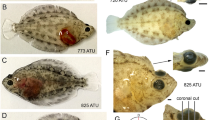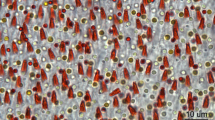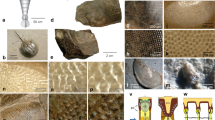Abstract
TRIPLE cones have previously only been observed in the retinæ of a frog, Rana temporaria 1, and of a gecko, Aristelliger praesignis 2, and in both these animals they are rare and atypical. I have examined many retinæ of trout, Salmo trutta, of all ages, and I have found a considerable number of triple cones which, from their distribution in the cone pattern, appear to be anomalous double cones. In the minnow, however, triple cones are abundant and predominate in most regions of the retina, and quadruple cones are numerous enough to suggest that they may have a significant function.
This is a preview of subscription content, access via your institution
Access options
Subscribe to this journal
Receive 51 print issues and online access
$199.00 per year
only $3.90 per issue
Buy this article
- Purchase on Springer Link
- Instant access to full article PDF
Prices may be subject to local taxes which are calculated during checkout
Similar content being viewed by others
References
Saxen, L., Acta Anat., 19, 190 (1953).
Underwood, G., Nature, 167, 183 (1951).
Author information
Authors and Affiliations
Rights and permissions
About this article
Cite this article
LYALL, A. Occurrence of Triple and Quadruple Cones in the Retina of the Minnow (Phoxinus laevis). Nature 177, 1086–1087 (1956). https://doi.org/10.1038/1771086a0
Issue Date:
DOI: https://doi.org/10.1038/1771086a0
This article is cited by
-
�ber das Lichtr�ckenverhalten des Guppy (Lebistes reticulatus) in farbigen und farblosen Lichtern
Zeitschrift f�r vergleichende Physiologie (1967)
-
Zur Histologie und Topochemie der Netzhaut des Menschen
Zeitschrift f�r Zellforschung und Mikroskopische Anatomie (1958)
Comments
By submitting a comment you agree to abide by our Terms and Community Guidelines. If you find something abusive or that does not comply with our terms or guidelines please flag it as inappropriate.



